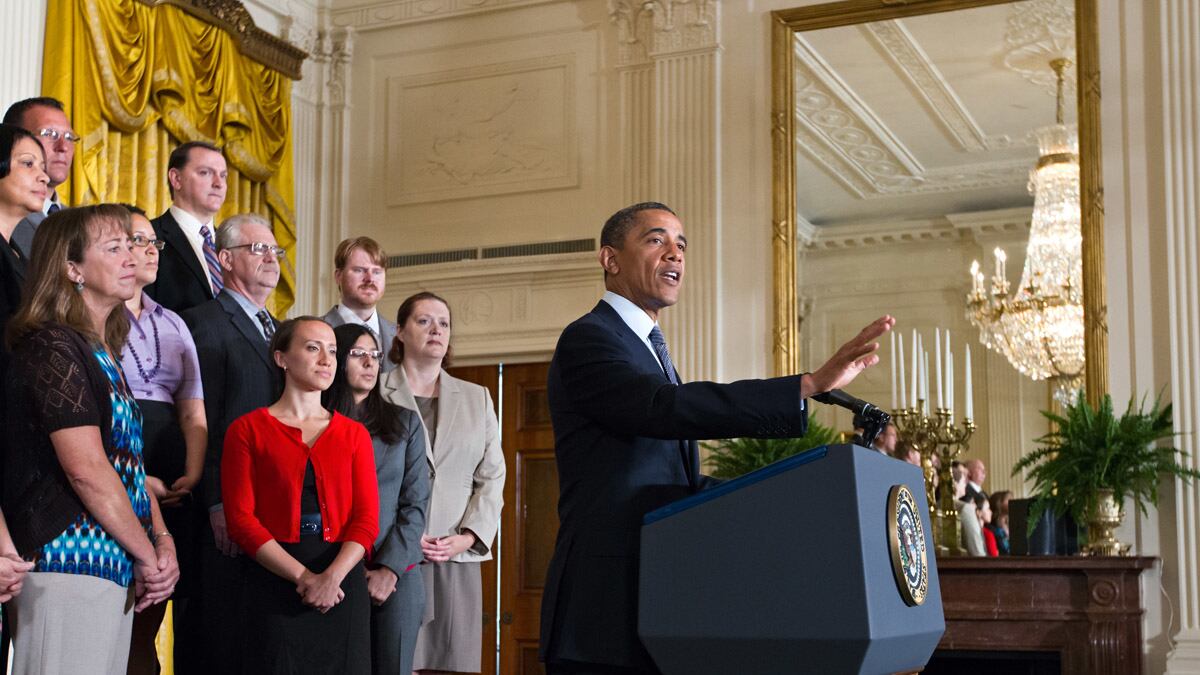It has been almost 12 months since the last, prolonged government standoff, when Capitol Hill and the White House bickered about raising the debt ceiling. So now, nearly a full year later, President Obama has launched his opening salvo for another fight certain to be long, messy and full of political point-making.
Mid-day Monday, President Obama announced his plan for the Bush tax cuts, the depressed tax rates that became law in 2003 that were extended last year. When they finally expire at the end of 2012, Obama will say, they should be extended only for those making less than a quarter-million dollars annually. For everyone else, they should go away permanently.
“I’m not proposing anything radical here,” Obama said in the East Room of the White House. “I’m just proposing that anyone making $250,000 a year should go back to the tax rates we were paying under Bill Clinton.” “This is not just my opinion,” he said later. “The American people are with me on this. Poll after poll shows this.”
The proposal is classic Obama—sticking his neck out for the small donors that elected him, effectively sticking the higher tax bill on higher earners, the ones that have been donating in droves to his opponent’s campaign.
But does it get him anything? Several political analysts say no, Obama’s tip of the hat is most generous toward his base, which is already paying enough attention that they’d vote for him anyway. What’s more, proposing the tax cut extension for one year is a more narrow position than what Obama had initially proposed earlier this year, that the cuts for middle class earners be extended permanently.
Instead, Stephen Hess of the center-left Brookings Institution sees Obama’s surprise decision as the opening shot in a months-long battle that will extend beyond the election.

“This is part of the back and forth that’ll go on until the end of the year,” says Hess, who worked for the Eisenhower and Nixon administrations and advised Presidents Carter and Ford. “What is said today doesn’t make much difference in what will actually happen.”
What it does achieve, however, might be strong footing in preparation for sharp negotiation. In the past, Obama has been oft criticized for weak bargaining. Congressional Democrats have accused the president of starting too far into the middle, and then eventually being pulled further to the right by entrenched Republicans. Last December, the last time the Bush tax cuts came up for extension, Vermont Rep. Peter Welch lamented that once Republicans dug in, all Democrats could do was start negotiating among themselves.
There already are some fractures in the Democratic caucus, which suggest Obama’s announcement Monday won’t be his final position on the issue. House Minority Leader Nancy Pelosi and Senator Chuck Schumer have previously advocated for the tax write offs to be extended for income up to $1 million.
White House officials would not say just how flexible Obama is on the issue, but a source with knowledge of the discussions over tax cut policy admits that the president will negotiate on the matter, especially considering that the debt ceiling and the defense spending sequester will also need to be addressed again before the end of the year. A final agreement is likely to include all components, each of them used as variables in the talks.
Both parties agree that taxes shouldn’t go up on middle-income earners—Republicans merely argue they should be extended for top earners as well—so it’s nearly certain that tax rates won’t skyrocket on January 1.
But it’s possible that a final agreement won’t be made with much time to spare. “This becomes another starting point for him,” says Hess. “It’s clear they’re going to work things out, but it’ll happen in a last-minute brouhaha.”






